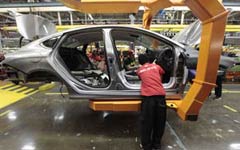Innovation to keep carmakers ticking
By Li Fangfang (China Daily) Updated: 2014-07-14 07:03The study said four out of 10 consumers would consider buying cars online.
"Obviously, the penetration of smartphones has had an impact on consumer behavior. It has become a channel of information and a tool for online payment," said Yu.
But manufacturer websites remain the most trusted channel for information, followed by professional automotive sites, dealer websites and e-commerce sites, said the study.
 |
 |
"It brings challenges but also opportunities for automobile companies to take a more innovative strategy by leveraging the advantages of third parties."
Brand reputation
According to the study, German brands were preferred by 48 percent of respondents, followed by American and Japanese brands. The preference for Chinese brands increased 2 percentage points from 11 percent in 2013 to 13 percent this year.
"Consumer attitudes toward the country origin indicate a growing challenge worth the attention of Chinese homegrown brands," said Yu.
The gap between Chinese and foreign brands is also reflected among respondents' opinions on dealer services, marketing communication, competitive position and image.
"The building of a successful brand relies on different factors, not only about product quality, safety and advanced technology, but also other touch points for a brand.
To innovate, Chinese brands need to improve the consumer experience at each touch point from product development to dealer showrooms and advertising effectiveness," said Dong.
- First private flying club draws crowds in Tianjin
- Making capital from the early investments
- TMT companies tap niche ADR route for long-term benefits
- Baidu big winner in World Cup
- Innovation to keep carmakers ticking
- Top 10 dairy companies in the world
- Luxury car sales keep foot on accelerator
- BRICS seeks new paths to develop

















